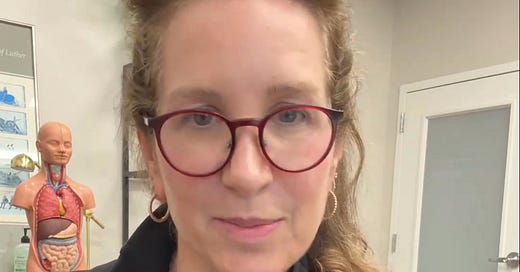Episode Summary
In this episode, Dr. Lucy McBride addresses the most common gastrointestinal complaints she encounters in her primary care practice. She emphasizes that most GI issues aren't mysterious and often have simple solutions when approached systematically. The conversation covers five main digestive problems—IBS, GERD, bloating and gas, constipation, and colon cancer prevention—while highlighting the important connection between emotional health and digestive symptoms. Dr. McBride advocates for a holistic approach that considers everything patients consume, their stress levels, and lifestyle factors, rather than relying solely on lab tests for common complaints.
Key Concepts
IRRITABLE BOWEL SYNDROME (IBS): IT'S REAL AND IT'S MANAGEABLE
IBS is a functional disorder where the colon becomes spastic and irritable, causing alternating diarrhea and constipation, bloating, gas, and abdominal discomfort - it's not dangerous but can be very distressing
Common trigger foods include alcohol, caffeine, sugar, dairy, and gluten, plus FODMAP foods (short-chain fermentable carbohydrates like beans and certain fruits and vegetables)
The gut is literally the "home of many of our emotions" - stress, anxiety, and emotional distress often show up as digestive symptoms, which is why travel causes constipation and anxiety can trigger diarrhea
Treatment involves systematically identifying your personal trigger foods, managing stress through exercise or therapy, and addressing underlying emotional health rather than just taking tests
GERD: WAY MORE THAN JUST HEARTBURN
GERD happens when stomach acid travels upward into the esophagus instead of downward - it can cause chronic cough, sore throat, sinus symptoms, and morning nausea, not just chest burning
Common culprits include NSAIDs (Advil, ibuprofen), acidic foods and drinks (wine, coffee, vinegar, tomatoes, citrus), certain medications, and emotional stress that increases acid production
Simple fixes include reducing acidic foods, elevating the head of your bed with wedge pillows, eating earlier in the evening, and reviewing your medication list with your doctor
Dr. McBride recommends the book "Dropping Acid" as a practical guide to reducing dietary triggers
Bloating and Gas: The Usual Suspects
Primary triggers include sugar-free gum and sweeteners, NSAIDs, too much fiber (yes, you can have too much of a good thing), eating too quickly, and not moving your body enough
Many gas-producing foods are FODMAPs, but don't eliminate everything on the list at once - pin it to your refrigerator and notice correlations between what you eat and your symptoms
Your gut needs movement to function properly - if your body isn't moving, your gut sits there "too quiet" and needs motion to get things going
Focus on gradual identification of your personal triggers rather than wholesale dietary restrictions that leave you feeling restricted
CONSTIPATION: FIBER IS YOUR FRIEND (PLUS A FEW OTHER HELPERS)
The most common cause is simply not getting enough dietary fiber from fruits, vegetables, leafy greens, and whole grains - "fiber, fiber, fiber, fiber, fiber"
GLP-1 medications like Ozempic, Mounjaro, and Wegovy commonly cause constipation as a known side effect
Dr. McBride's go-to recommendations include Colace (docusate) as a safe stool softener, magnesium supplements (400-500mg) for muscle relaxation, and Swiss Kriss - however hers is not a substitute for advice from your personal physician
Don't forget the basics: regular exercise, adequate hydration, and stress management all support healthy bowel motility
COLON CANCER SCREENING: THE GOALPOST HAS MOVED
Screening colonoscopy is now recommended starting at age 45 (down from 50), or earlier if you have a family history of colon cancer, especially in first-degree relatives
Colonoscopy is both diagnostic and therapeutic - it can detect cancers and polyps while removing polyps during the procedure to prevent future cancer
Cologuard stool tests are "pretty amazing" technology but aren't as sensitive as colonoscopy and can't remove polyps if found
Red flags requiring immediate medical attention include rectal bleeding, persistent changes in bowel habits lasting weeks or months, unintentional weight loss, and severe abdominal pain
THE GUT-MIND CONNECTION: YOUR EMOTIONS LIVE IN YOUR STOMACH
Stress, anxiety, and emotional distress commonly express themselves through digestive symptoms - some patients use their gut as a "check engine light" for when they need better self-care
Address mental health through therapy, exercise, journaling, and stress management alongside dietary changes for the most effective treatment
Upshot
Common digestive complaints often have straightforward solutions that don't require extensive testing or complex interventions. The key lies in taking a systematic inventory of everything consumed, recognizing the profound connection between emotional health and gut function, and addressing lifestyle factors like movement and hydration and behaviors around eating. She advocates for patients to become detective-like in tracking their symptoms and triggers, while also ensuring appropriate medical evaluation to rule out serious conditions.












Share this post